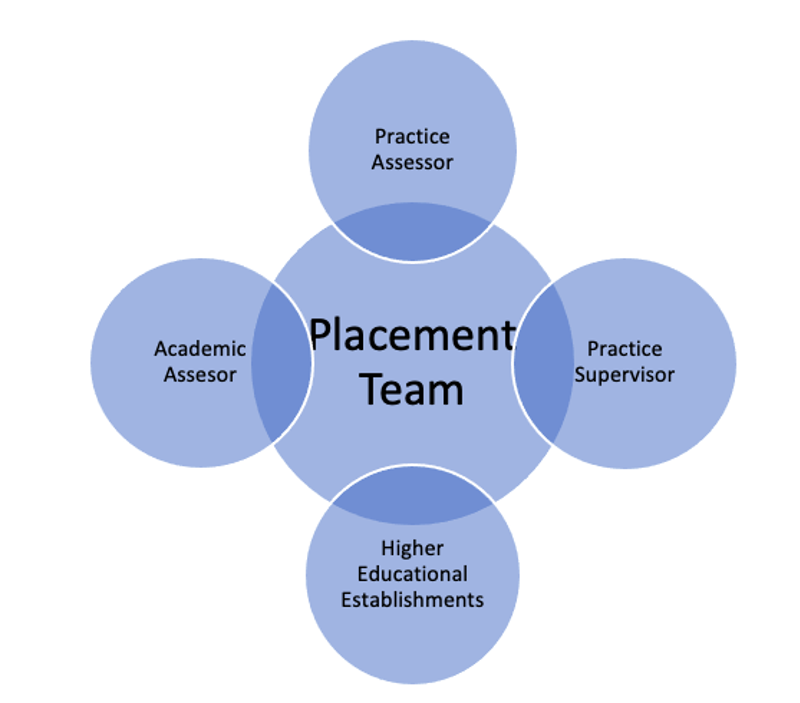Supervision – supporting student nurses

The purpose of clinical supervision is to provide students on placement in a clinical/ward environment with the optimal opportunity to ensure that they are ready for practice as a qualified nurse having met (and hopefully exceeded) the required outcomes of their program of study through experiential learning.
This ensures that the gap between theory and practice is narrowed, and the student is given a better grounding in the fundamentals of nursing than would be available in a purely academic environment.
All nurses are governed by The Code (Nursing Midwifery Council (NMC), 2018g). With such governance, the benefits of supervision are clear for all parties. The purpose of this article is to consider further how as nurses we cannot only uphold The Code (NMC, 2018g), but also to develop ourselves and students through clinical supervision.
Practice supervision of students
The NMC (2019) created the Standards for Student Supervision and Assessment. The purpose of the standards was to establish a quality led baseline of support that students should expect receive and nurses should provide, so high-quality learning and support underpins the development towards becoming a qualified nurse. The NMC (2019) standards are crucial to our learning and support environment.
The standards also help to crystalise the type of supervision that may be expected during placement. Furthermore, setting out standards including roles and responsibilities in practice allows supervisors and assessors to make sure that their students receive the highest quality of opportunity during those valuable periods in a practice environment where they can put learning theory into practice.
In realising the Professionalism Standards for Education and Training, the standards for student supervision and assessment are set out (NMC, 2018a). This document alongside the pre-registration nursing agenda NMC (2018 b), and program standards were revolutionary in the way that nurse education and subsequently practice learning environments would be utilised to support students and practitioners who were working with students.
The NMC considers that learning culture with appropriately approved local educational establishments, educational governance and quality learning environments are crucial to the student experience. This ensures that support is there, and that curriculum and assessment meets the requirements of students in order to practice safely and effectively within a practice area.
The whole Realising Professionalism agenda was about making sure that all members of the team supporting students are fit for purpose, and that nursing students can realise their potential in accordance with the NMC requirements of a nurse at point of entry.
For an effective practice learning environment, nurses and students need to feel supported, and nurses who are supervising students need to understand the background behind the current supervision model. This enables the outcomes of student supervision to be understood which gives reassurance to the supervisor.
Changes from the NMC (2018) serve to ensure that all NMC registered nurses, midwives and nursing associates are theoretically capable of supervising students; thus, enabling them to serve as role models to ensure safe and effective practice. This change has been key because it means that all nurses, midwives and nursing associates have the opportunity to support students in a clinical capacity. This does, nevertheless, require some considerations to be met before it becomes an optimal approach.
Who makes up the placement team?

Practice Assessor NMC (2018 D)
These are registered practitioners who are nominated to make recommendations for progression for an assigned student against set criteria. They have relevant preparation and support to undertake this role whilst having knowledge and experience in relation to the programme they are assessing. The role supports the student to evidence their practical development, and links in with the practice learning partners to ensure that they can evidentially confirm student achievement while reaching targeted outcomes set by their programme of study.
The purpose of the practice assessor is to record and objectify the evidence-based assessments on:
- Conduct
- Proficiency and achievement
- Student self-reflection
- Student records
- Direct observation
- Work products/outputs
- Professional discussions with the practice supervisor
- Reference points
To provide the most effective support to the student, the practice assessor must marry current professional knowledge and expertise with the proficiencies and outcomes required of the program of study.
It is important that the practice assessor works in conjunction with the higher educational establishments and is aware of the nominated academic assessor and student progression for each part of the programme they are assessing in relation to the student.
It is important that practice assessors have a good understanding of the curriculum so that they can assess against the required criteria, and provide accurate feedback on progression. In order to be a practice assessor, it is important to undertake or prepare evidence that enables clear demonstration of achievement.
The NMC (2018d) standards for student supervision and assessment require that a practice assessor must have:
- Relevant skills to the student learning and assessment which include interpersonal skills and communication
- The skills to produce evidence-based assessments of students that are objective
- The ability to provide professional development in others through constructive feedback
- The knowledge about assessment and process including their role within it
The academic assessor must be supported by their organisation and/or ensure that they receive ongoing support with the opportunity to reflect and develop within this role. The importance of being proactive and understanding the proficiencies of the programme alongside outcomes is critical to success.
Practice supervisors NMC (2018E)
The role of the practice supervisor is to help students to undertake safe and effective practice in line with The Code (NMC, 2018g). In theory, any registered health and social care professional working in a practice environment can become a practice supervisor. This is, however, dependent on several factors if the supervision is to be successful in supporting the student effectively while ensuring safe practice.
As a practice supervisor, adequate preparation and support is required to ensure that they can take up and carry out the role with the approach of being a ‘Role Model’. This requires the opportunity to prepare, reflect and develop the mindset to support students. It also requires the practice supervisor to understand the proficiencies of the educational program and the required outcomes so they can support the student to achieve the goals that have been set.
It is essential that they have up-to-date knowledge and experience which is relevant to the student that they are supervising. A key to being an effective practice supervisor is their own continuous learning and professional development as a life-long learner. Without this, they cannot support the student with latest methods, philosophy and practice in an ever-evolving workplace.
Higher educational establishments (NMC, 2018 F)
The higher educational partnership with the approved training providers is a bedrock of effective supervision. It provides an approved program accredited by the NMC and provides a mechanism that allows supervision in a clinical environment by suitably qualified clinical practitioners while providing the academic rigour to support learning.
The higher educational establishments (or approved educational institutions) are required to work alongside the partner providers. This ensures that they supply Academic Assessors with the correct information, support and ability to assess students and record all discussions while taking account of advances in clinical practice, and reflecting these in the programme of study.
Partner providers are required to ensure the Academic Assessors are up-to-date with current knowledge and expertise. Academic Assessors understand the learning outcomes and achievements required in practice to meet the outcomes of the programme of study.
It is imperative that communication and collaboration between the academic and practice assessors is scheduled and that the programme offers support and links to student progression.
Academic assessor (NMC, 2018 F)
Academic assessors are representatives from the higher educational institution who will work alongside the practice supervisors and practice assessors. In order to be an academic assessor, they must be a registered nurse midwife, nursing associate or SC PHN (Specialist Community Public Health Nurse).
In essence, they are a suitably qualified professional who bridges the theory to practice divide, providing support to student, supervisor and assessor alike to ensure learning outcomes are achieved and evidenced so the student can progress through the programme of study towards qualification. They must, equally, be prepared to challenge if the required outcomes of the programme of study are not being achieved so progression through the curriculum is supported by correct assessment and evidence of required criteria being met.
The tripartite approach to supervision
All students working within a practice learning environment are in essence tested against the skills that are required for their stage of training, their assessment is in line with their higher educational establishments programme of study, which will provide periodic criterion that they must achieve.
To ensure this happens, all students should be aligned with a practice assessor and a practice supervisor. This ensures that the student is able to meet not only the proficiencies of the programme of study, but also works in accordance with The Code (NMC, 2018g). The bridge with the higher educational establishment is the Academic Assessor.
This representative tripartite link of practice supervisor, practice assessor and academic assessor enables a closer link between theory and practice so the wider professional requirements of the NMC and academic rigour of the Higher Educational Establishment are upheld and not compromised.
This tripartite approach of assessment, supervision and academic rigour ensures student development in a supported professional led environment. All parties have clear defined roles and responsibilities that come together to provide an effective framework for supervision and development towards defined outcomes.
For this to work optimally, the people in these roles need to be of equivalent experience for the student’s field of practice; for example, a person from a midwifery background needs to supervise/assess a midwife and a person from a nursing background needs to supervise/assess a nurse. This is to ensure that they as practitioners or academic assessors understand the student field of practice and can provide appropriately focussed specialist support to nurture the student to the desired outcome.
Both practice and academic assessors are expected to appropriately raise and respond to concerns that may occur - for example student conduct or competence - and respond to any issues that occur.
It is important that as a nurse you are understanding of how to raise a concern particularly in relation to anecdotal evidence which states that nurses do not like to fail students. Without this candour, the process of Supervision can be devalued and potentially compromised, for the professional nurse, for the student and for the Higher Education Establishment.
Conclusion
In summary, the Nursing and Midwifery Council (2018 C) stipulate that they have a duty of care to review the standards of proficiency for all practitioners. Registered nurses play a valuable role in providing leadership and coordination of care, and they are accountable for their own work. This may be as a student or as another key practitioner.
Registered nurses must provide leadership to people from all ages and backgrounds and beliefs. As continuing changes in clinical practice are implemented, it is essential that nurses remain up-to-date with the requirements they need to supervise, assess and support.
Organisationally, nurses need to ensure that they understand their requirements and work alongside partnerships and organisations to meet the outcomes required for, evidencing progression through the programme of learning, and speaking up when outcomes are not being met so support can be provided while upholding the Requirements of The Code (NMC, 2018g).
References
Nursing and midwifery Council (2019) standards for student supervision and assessment available at; Standards for student supervision and assessment - The Nursing and Midwifery Council (nmc.org.uk) accessed 11 September 2022.
Nursing and midwifery Council (2018a) part two: standards for student supervision and assessment-realising professionalism standards for education and training available at; Standards for student supervision and assessment - The Nursing and Midwifery Council (nmc.org.uk) accessed 11th of September 2022.
Nursing and Midwifery Council (2018b) Part one: Standards Framework for nursing and midwifery Education Available at Standards framework for nursing and midwifery education - The Nursing and Midwifery Council (nmc.org.uk) accessed 11th of September 2022.
Nursing and midwifery Council (2018 C) part 3 standards of proficiency for registered nurses available at: Standards of proficiency for registered nurses - The Nursing and Midwifery Council (nmc.org.uk) accessed 11 September 2022.
Nursing and midwifery Council (2018 D) who are practice assessors and how are they prepared? Reference: PA one Available at: Who are practice assessors and how are they prepared? - The Nursing and Midwifery Council (nmc.org.uk) accessed 11 September 2022.
Nursing and midwifery Council (2018 e) who are practice supervisors and how are they prepared reference PS one available at Who are practice supervisors and how are they prepared? - The Nursing and Midwifery Council (nmc.org.uk) accessed 11 September 2022.
Nursing midwifery Council (2018 F) who can be an academic assessor? Reference: AC1-a available at Who can be an academic assessor? - The Nursing and Midwifery Council (nmc.org.uk) accessed 11 September 2022.
Nursing and Midwifery Council (2018 g) The code available at The Code: Professional standards of practice and behaviour for nurses, midwives and nursing associates - The Nursing and Midwifery Council (nmc.org.uk) accessed 11th of September 2022.

